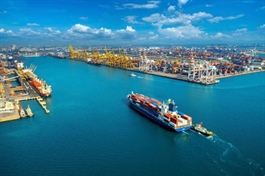New chapter for Vietnam’s underperforming banks
New chapter for Vietnam’s underperforming banks
Amid growing pressure to restructure underperforming banks, Vietnam’s banking sector is approaching a pivotal turning point. Dr. Tran Phuoc Huy, chief of office at the School of Banking and Finance under the National Economics University, shared his insights with VIR’s Khanh Linh on the path forward for weak credit institutions.

Dr. Tran Phuoc Huy, chief of office at the School of Banking and Finance under the National Economics University |
After Decree No.69/2025/ND-CP took effect in May, raising the foreign ownership limit in banks restructuring weak institutions from 30 to 49 per cent, how significant will this policy shift be in advancing banking sector reform, and could it serve as a pivotal catalyst for accelerating the process?
One of the most defining developments in the banking system in recent times has been the restructuring of weak credit institutions. Last year witnessed a wave of mergers and acquisitions between major banks and struggling institutions. Vietcombank took over Construction Bank at the end of 2024, while MB, HDBank, and VPBank have respectively acquired OceanBank, DongA Bank, and Global Petroleum Bank in early 2025.
These are concrete steps in restructuring the system of credit institutions, which aims to create a sound financial environment, enhance systemic resilience, and minimise risks.
More importantly, the process has received strong guidance from above, demonstrating clear political will to resolve long-standing issues, while enhancing transparency and operational efficiency within the banking system.
In this broader context, opening the door wider to foreign capital is seen as a potentially breakthrough move. A significant contributor to this restructuring process is the government’s newly issued policy. Specifically, Decree 69 amends and supplements several provisions of a 2014 decree on foreign investors buying shares in Vietnamese credit institutions.
Decree 69 is considered a substantial policy boost, not only removing capital bottlenecks for banks undertaking the task of acquiring weak institutions, but also creating favourable conditions to attract strategic investors with expertise in governance, technology, and modern financial products.
How might weak banks benefit from the foreign ownership cap increase, and what key challenges could they encounter in translating this policy into effective implementation?
The development potential brought by this open policy is accompanied by greater demands on governance and risk control capacity. In reality, banks acquiring weak credit institutions face numerous challenges in dealing with non-performing assets, integrating technology systems, and standardising internal governance frameworks.
Without a clear strategy and strong resources, such mergers could exert considerable pressure on balance sheets, affect capital adequacy ratios, and diminish overall operational performance.
On the other hand, the relaxation of foreign ownership limits not only facilitates the restructuring of weak banks, but also brings broader positive implications for the financial and stock markets.
As Vietnam strives to upgrade its market status from frontier to emerging, a series of reforms are underway, including enhanced information transparency, foreign ownership liberalisation, and improvements in payment infrastructure. Expanding investment space for foreign investors in the banking sector - one of the economic pillars, will enhance the appeal of Vietnam to global long-term funds seeking high-growth markets and asset revaluation opportunities.
For international investors, banks involved in restructuring weak credit institutions are not merely risky assets but represent transformation stories that could yield attractive medium- and long-term returns.
What key steps should restructured banks take to align with the expectations of foreign investors while ensuring long-term sustainability?
To effectively capitalise on the opportunities brought about by the newly issued policy, Vietnam’s banking system must act with urgency, coordination, and strategic clarity across multiple dimensions.
At the core lies the imperative for strict adherence to international standards on capital adequacy, risk management, and anti-money laundering, specifically frameworks such as Basel II and Basel III. Compliance with these standards enhances institutional credibility and serves as a critical foundation for building investor confidence, particularly among foreign stakeholders with long-term interests.
Banks must prioritise transparent and durable strategic partnerships with foreign investors. It is essential to move beyond a transactional mindset of divesting shares for short-term capital gains and instead adopt a long-term perspective focused on shared governance and operational transformation.
Equally important is the need to strengthen technological capacity, especially in digital infrastructure and cybersecurity, develop innovative financial products tailored to evolving market needs, and significantly upgrade human capital. Building a workforce equipped with the skills and mindset to operate in a more transparent, tech-driven, and internationally integrated environment is vital.
These capabilities will help enhance the intrinsic value of each institution and improve competitiveness not only in the domestic market but also within the broader regional context.
- 10:38 15/07/2025




























